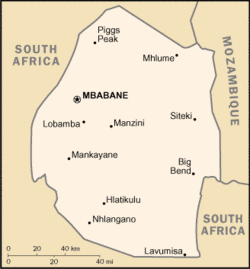Welcome to the Virtual Education Wiki ~ Open Education Wiki
Eswatini: Difference between revisions
(comments hided) |
(added general material) |
||
| Line 1: | Line 1: | ||
== Partners situated in Swaziland == | == Partners situated in Swaziland == | ||
None. | |||
== Swaziland in a nutshell == | == Swaziland in a nutshell == | ||
(sourced from http://en.wikipedia.org/wiki/Swaziland) | |||
''Swaziland'', the '''Kingdom of Swaziland''' ('''Umbuso weSwatini'''), sometimes called '''Ngwane''', is a landlocked country in Southern Africa, bordered to the north, south, and west by [[South Africa]], and to the east by [[Mozambique]]. | |||
The nation, as well as its people, are named after the 19th century king Mswati II. | |||
Its population is 1.18 million. | |||
Its capital is Lobamba (royal capital) and Mbabane (administrative capital and the largest city). | |||
Swaziland's economy is dominated by the service industry, manufacturing and agriculture. Some 75% of the population are employed in subsistence farming, and 60% of the population live on less than US$1.25 per day. | |||
Swaziland's main trading partner is South Africa, and its currency is pegged to the South African rand. | |||
Swaziland's economic growth and societal integrity has been highly endangered by an ongoing HIV epidemic. | |||
[[Image:Swaziland.gif|center|thumb|250px|Source : http://www.cia.gov]] | [[Image:Swaziland.gif|center|thumb|250px|Source : http://www.cia.gov]] | ||
== Swaziland education policy == | == Swaziland education policy == | ||
Education in Swaziland is neither free nor compulsory. In 1996, the net primary school enrollment rate was 90.8%, with gender parity at the primary level. In 1998, 80.5% of children reached grade five. | |||
| Line 19: | Line 38: | ||
=== Universities in Swaziland === | === Universities in Swaziland === | ||
The University of Swaziland seems to be the only one. | |||
=== Polytechnics in Swaziland === | === Polytechnics in Swaziland === | ||
| Line 27: | Line 47: | ||
=== The Bologna Process === | === The Bologna Process === | ||
| Line 48: | Line 66: | ||
=== Interesting Virtual Campus Initiatives === | === Interesting Virtual Campus Initiatives === | ||
=== Interesting Programmes === | === Interesting Programmes === | ||
=== Re.ViCa Case-study === | === Re.ViCa Case-study === | ||
None. | |||
| Line 69: | Line 89: | ||
[[Category:Africa]] | [[Category:Africa]] | ||
[[Category:Southern Africa]] | [[Category:Southern Africa]] | ||
[[Category:Commonwealth countries]] | |||
[[Category:Countries of interest]] | |||
Revision as of 21:23, 8 January 2010
Partners situated in Swaziland
None.
Swaziland in a nutshell
(sourced from http://en.wikipedia.org/wiki/Swaziland)
Swaziland, the Kingdom of Swaziland (Umbuso weSwatini), sometimes called Ngwane, is a landlocked country in Southern Africa, bordered to the north, south, and west by South Africa, and to the east by Mozambique.
The nation, as well as its people, are named after the 19th century king Mswati II.
Its population is 1.18 million.
Its capital is Lobamba (royal capital) and Mbabane (administrative capital and the largest city).
Swaziland's economy is dominated by the service industry, manufacturing and agriculture. Some 75% of the population are employed in subsistence farming, and 60% of the population live on less than US$1.25 per day.
Swaziland's main trading partner is South Africa, and its currency is pegged to the South African rand.
Swaziland's economic growth and societal integrity has been highly endangered by an ongoing HIV epidemic.

Swaziland education policy
Education in Swaziland is neither free nor compulsory. In 1996, the net primary school enrollment rate was 90.8%, with gender parity at the primary level. In 1998, 80.5% of children reached grade five.
Swaziland education system
Higher education
Universities in Swaziland
The University of Swaziland seems to be the only one.
Polytechnics in Swaziland
Higher education reform
The Bologna Process
Administration and finance
Quality assurance
Swaziland HEIs in the information society
Towards the information society
Information society strategy
Virtual Campuses in HE
Interesting Virtual Campus Initiatives
Interesting Programmes
Re.ViCa Case-study
None.